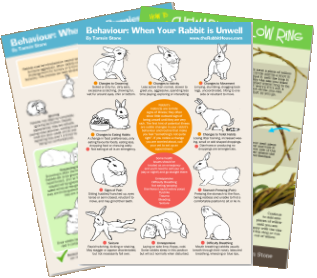Rabbit Diet and Feeding
Rabbits are herbivores (plant eaters). In the wild, their main diet is grass although they also eat a range of other vegetation including leaves, twigs, and tree bark. All these foods have something in common: they are high in fibre but low in nutrients. To cope with this, rabbits have evolved a specialised digestive system that can process plant fibre and extract the additional nutrients locked inside (something that most animals, including humans, are not able to do).
Rabbits' specialized digestive system means you must feed the right combination of foods to keep your rabbit healthly and their digestive system working effectively.
The Basics
Around 80% of a rabbit's diet should be grass or hay (dried grass). The rest is made up of a combination of fresh foods (e.g. vegetables and plants) and commerical dry food (e.g. pellets/nuggets). Select the foods below to learn more about each.



Monitoring Your Rabbit's Diet
No single diet can be right for every rabbit and getting the right balance of foods can be complicated. Even rabbits the same size may have different diet requirements. The exact combination and quantity of foods a rabbit requires daily to meet their energy and nutrient needs depends on several factors including their age, size, environment, and level of physical activity. As these factors change throughout your rabbit's life you will need to reassess their diet regularly to ensure it is still meeting their needs.
- Factors effecting nutritional requirements
- Monitoring Your Rabbit's Weight
- Monitoring Your Rabbit's Droppings
Why is a Rabbit's Diet Important?
Preventing Health Problems
Having such a specialised digestion system has drawbacks. Whilst it's very efficient at processing high fibre food, the wrong types of food or sudden diet changes can easily disrupt it throwing the whole digestive system out of balance. This can have serious consequences, the most common include:
- 'Sticky Bottom'
This is the common name for the production of excess ceacal droppings, which is characterised by sticky droppings caught in the fur around the tail. It leaves a rabbit prone to secondary problems like flystrike. This is often the first indication that your rabbit's diet isn't quite right. - Stasis
Stasis is a potentially fatal illness in which the content of the gut stops moving along the digestive tract. The initial symptoms are a loss of appetite and reduction in size and quantity of droppings, as it progresses dropping production completely halts. Without prompt treatment, a rabbit will deteriorate rapidly. - Bloat
This has similar symptoms to stasis but the gut becomes filled with gas. This is very painful and again needs prompt veterinary intervention.
Diet is also a factor in other health problems, such as:
- Dental Health
Rabbits teeth grow continually throughout their life. An appropriate diet, high in rough fibre, such as grass and hay, is essential to prevent the teeth growing too long and cutting into the tongue and cheeks. As well a mouth injuries, dental problems can results in long term problems with overgrown roots, tooth abscesses and blocked tear ducts. - Obesity
Being overweight puts extra pressure on your rabbits body and organs which can results in sore hocks, heart and liver disease and mobility impairments.
Whilst diet is not the only factor in preventing illness and disease, it plays an important part in maintaining your rabbit's health and well-being. By feeding the right foods, you can prevent a whole range of health problems and in doing so lengthen your rabbit's lifespan.
Behaviour
The types of food you feed and the manner in which you feed them also affect your rabbit's behaviour. Wild rabbits naturally spend over two-thirds of each day moving around their territory grazing. When pet rabbits are fed too much concentrated food, which is quick to eat, they often become bored and develop behaviour problems because they do not have any activities to fill the hours that would usually be spent feeding. With no appropriate outlet for foraging behaviours, such as striping bark from trees, they can become destructive behaviours, like wallpaper striping and cage chewing. By making your rabbit's diet and feeding pattern more natural, you can encourage your rabbit to exercise both its brain and body, helping to maintain a healthy weight and prevent boredom.
Please note: you should never make sudden changes to your rabbit's diet. Even if your rabbit has a 'bad' diet, suddenly changing to a 'good' diet can do more harm than good. Changing or introducing new foods should always be done gradually.


















